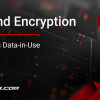Three Industry Trends You Missed from ICMC 2023

The International Cryptographic Modules Conference (ICMC) is where the world’s leading cryptography experts gather each year to discuss the most critical industry challenges and trends.
This September, held in Ottawa, Canada, Futurex was honored to participate in two sessions.
One presentation, delivered by Adam Cason, VP of Global and Strategic Alliances at Futurex, shared some of the top industry trends and provided insight into the future of cloud payments. The second, a panel discussion with some of the industry’s top thought leadership gurus, shared cutting-edge cryptography trends.
These well-received sessions gained the attention of fellow industry leaders from over two dozen countries. This blog brings you the top three takeaways from the experts at the forefront of global cryptography.
1. The more encryption, the better
Data is valuable, especially to cybercriminals. But what if you take away that value? That’s what encryption does: it devalues data in the event of a cyber incident. With the right type, level, and amount of encryption protecting an organization’s data, that data becomes unreadable to unauthorized users and cybercriminals. Using encryption solutions across your enterprise makes data worthless for cybercriminals while remaining valuable for authorized parties.
In the panel session, “Trends and Issues in Cloud Computing Cryptography,” there was broad consensus: the more encryption, the better. Especially as organizations become increasingly digital. Companies are deploying more applications, using more cloud services, and storing more data than ever. This trend is expected to increase. To stay ahead of the security curve, organizations should look to use encryption solutions anywhere and everywhere they can.
2. How fast can you get to the cloud?
On-premises has been the de facto standard for decades. However, while on-premises is a trusted and stable solution, some drawbacks exist. Among them:
- scalability is limited by power and space resources,
- it hinders the ability to shift from a CapEx to an OpEx model,
- and limited flexibility as hardware deployments are dedicated to the use case where they are installed.
The cloud has made HSMs more accessible than ever.
Forward-thinking architects are leveraging numerous advantages unique to cloud HSMs: on-demand deployment, nth-degree scalability, the ability to deliver as-a-service cryptographic solutions to any encryption need, hardware-backed data protection, and (given the right provider) low latency and high availability.
3. Migrate to cover multiple standards in one solution
There are three things on the minds of every cryptography expert worldwide: standards, standards, and standards. Those who develop, produce, test, specify, and use cryptographic modules face imposing challenges, primarily compliance. At ICMC 2023, this singular topic was observed across multiple sessions and focused on standards like PCI, FIPS, ISO/IEC 19790, eEIDAS, and Common Criteria. Organizations should be on the lookout for cryptographic solutions that offer a high level of compliance with multiple standards.
Want to learn more about the future of cryptography and compliance? Check out our Compliance Standards blog here.
FAQ
How does encryption protect data during cyber incidents, and what should organizations consider to keep data unreadable to unauthorized users?
Encryption plays a vital role in devaluing data by rendering it unreadable to unauthorized users and cybercriminals in the event of a cyber incident. The process involves applying the right type, level, and amount of encryption to protect an organization’s data. The key considerations for organizations include selecting appropriate encryption solutions that encompass their entire enterprise, ensuring the encryption is robust enough to safeguard against cyber threats, and implementing encryption consistently across applications, cloud services, and stored data.
What benefits do cloud Hardware Security Modules (HSMs) provide compared to on-premises solutions in cloud computing cryptography?
Cloud Hardware Security Modules (HSMs) offer several advantages over traditional on-premises solutions in cloud computing cryptography. These include on-demand deployment, nth-degree scalability, the ability to deliver cryptographic solutions as a service, hardware-backed data protection, and potentially low latency and high availability depending on the chosen cloud provider. Forward-thinking architects leverage these advantages to enhance cryptographic solutions by gaining flexibility, cost-effectiveness, and the ability to adapt to varying workloads without the limitations associated with on-premises hardware deployments.
Why is meeting cryptographic standards crucial for organizations, and how can they address this challenge through cryptographic solutions?
Compliance with cryptographic standards is a significant concern for organizations due to the challenges imposed by regulatory requirements, particularly in areas such as PCI, FIPS, ISO/IEC 19790, eEIDAS, and Common Criteria. The focus on compliance ensures that cryptographic modules meet specific security and performance criteria. To address this challenge, organizations should seek cryptographic solutions that offer a high level of compliance with multiple standards. This approach not only helps organizations meet regulatory requirements but also ensures a strong foundation for the development, production, testing, specification, and use of cryptographic modules in a secure and standardized manner.






